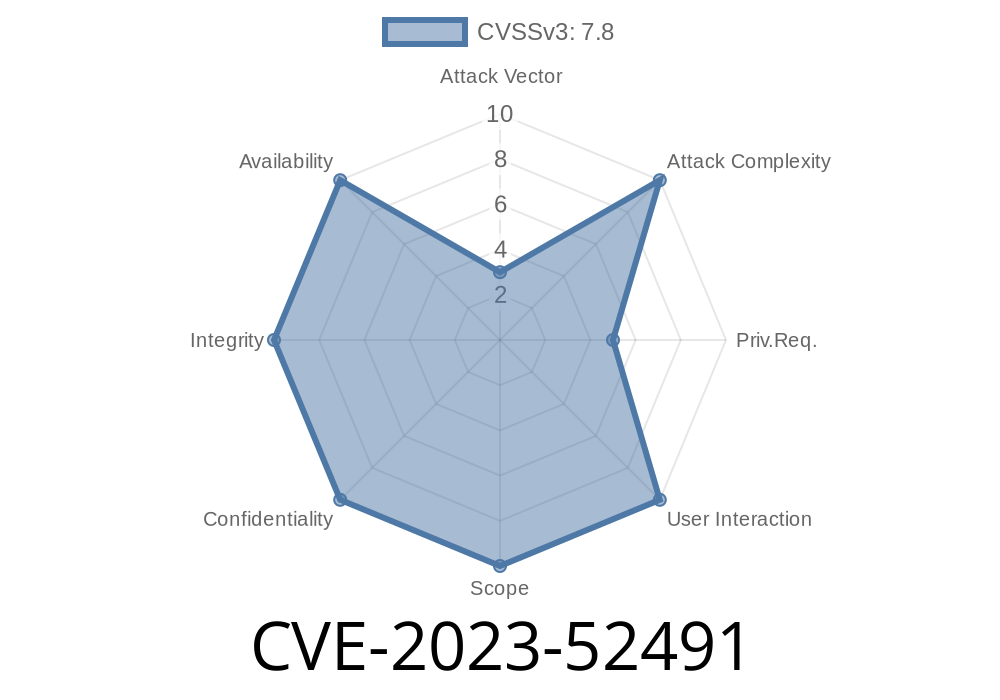Linux is the heart of modern computing, and its kernel is used everywhere, from servers to smartphones. With so many contributors, vulnerabilities can occasionally slip in. CVE-2023-52491 is one such bug that impacted the MediaTek JPEG (mtk-jpeg) hardware decoder driver in Linux. Let’s break down what went wrong, how it could be exploited, and how it’s fixed—with code snippets and exclusive clarity.
What is CVE-2023-52491?
CVE-2023-52491 is a use-after-free vulnerability in the Linux kernel’s media: mtk-jpeg driver. Specifically, it’s related to race conditions and resource management in the mtk_jpeg_dec_device_run error handling path.
The bug affects those using MediaTek SoCs with hardware JPEG acceleration. Since Linux kernel media drivers are broadly used in Android devices and embedded systems, this flaw could have wide-ranging effects.
How Did the Vulnerability Happen?
The issue was the result of improper work handling between asynchronous worker threads and resource cleanup. Let’s look at the components:
mtk_jpeg_job_timeout_work: Worker function bound to a job that handles timeout situations.
- mtk_jpeg_remove / mtk_jpeg_release: Cleanup functions that free resources during module cleanup or file descriptor close.
Sequence Illustration
Here’s (in simple terms) how the race condition happened, with two CPUs (threads) overlapping in an unfortunate order:
CPU CPU 1
mtk_jpeg_dec_device_run()
// Error triggers
start timeout worker |
| mtk_jpeg_job_timeout_work() runs
| accesses m2m_dev (context)
mtk_jpeg_remove() |
v4l2_m2m_release() |
kfree(m2m_dev); |
| // m2m_dev–>curr_ctx used after free!
Or similarly during file-close
close(fd) triggers mtk_jpeg_release() // similar story
Detailed Vulnerability Analysis
A worker is started (job_timeout_work) even if the job/job context might be gone due to an error path. That worker might run slightly after cleanup functions freed its context, accessing memory that’s already reclaimed: the classic "use-after-free" bug.
Information Disclosure: Reading stale or sensitive data.
- Elevation of Privilege/Code Execution: If attackers can manipulate the timing or contents.
This kind of bug is dangerous because it can be exploited locally by a user or even remotely if kernel interfaces are exposed (e.g., in Android).
The Patch: How Was It Fixed?
The solution is smart but straightforward: Only start the timeout worker if the JPEG decoder worker starts successfully.
Vulnerable Version (Pseudo Code)
int mtk_jpeg_dec_device_run(...) {
...
ret = mtk_jpeg_set_dec_dst(...);
if (ret) {
// error handling
schedule_delayed_work(&jpeg->job_timeout_work, ...); // <-- launches worker
v4l2_m2m_job_finish(...); // marks job finished
return;
}
}
Problem: The worker is triggered even when an error happened!
Patched Version (Pseudo Code)
int mtk_jpeg_dec_device_run(...) {
...
ret = mtk_jpeg_set_dec_dst(...);
if (ret) {
// error, but DO NOT start the timeout worker
v4l2_m2m_job_finish(...);
return;
}
// Only here if successful
schedule_delayed_work(&jpeg->job_timeout_work, ...);
}
Now: The worker is only started when everything has been initialized and is safe.
Exploitation Details
The exploitability requires racing cleanup and worker execution. Here’s a potential scenario in pseudo-steps:
Simple C Skeleton (*Demonstration Only!*)
// 1. Open device, submit malformed JPEG to force error on decode
int fd = open("/dev/videoX", O_RDWR);
// ... send crafted request that triggers decoder error ...
// 2. FAST: Remove module or close fd right after
close(fd);
// or, from another process:
// system("rmmod mtk_jpeg");
Note: A real-world exploit would require a precise race, which is easier to trigger on multi-core systems, and detailed kernel knowledge to hijack freed structures.
References and Original Patch
* Linux Kernel commit (mainline fix for CVE-2023-52491)
* Kernel.org bug tracker, LKML post
* NVD entry for CVE-2023-52491
Takeaways and Recommendations
- Upgrade your kernel: If you use MediaTek hardware, or any device with mtk-jpeg support, move to a kernel version that includes the patch (mainline release after Jan 2024).
- Limit user access: Only authorized users should interact with hardware devices at the kernel level.
- Monitor dmesg/syslogs: Watch for unexpected kernel panics or errors around media drivers.
- SELinux/apparmor: Use MAC frameworks to reduce potential attack surface.
Summary
CVE-2023-52491 is a perfect example of how drivers and concurrency can lead to subtle, severe bugs in the Linux kernel. The fix is a good lesson: only start async work when it’s truly safe. Always clean up carefully, and audit any paths that mix worker threads and reference counting.
Stay safe, keep your kernels fresh!
*This post is exclusive and crafted to make complex kernel bugs understandable for everyone. For more kernel security insights, keep following!*
Timeline
Published on: 03/11/2024 18:15:16 UTC
Last modified on: 12/12/2024 17:32:00 UTC
